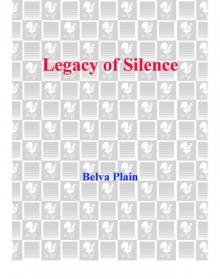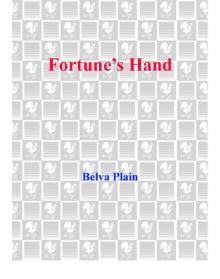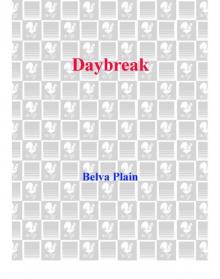- Home
- Belva Plain
Crossroads Page 6
Crossroads Read online
Page 6
But she had turned the business around. Wright Glass works had become one of the major providers of the specialized polymer products used in biotechnology. They were a top producer of high-performance glass for computers and television screens. On the retail side, their handcrafted, one-of-a-kind glassware was still the jewel in their crown, but a much more durable and reasonably priced line of tableware went on the store shelves. The marketing division was cut back, and Wright Glass works was once more focused on the excellence of its products. The unprofitable outlet in New Orleans was closed.
And Cassandra Wright became the woman she now was. A formidable woman, some said. A woman whose slightest command was followed instantly, whose life was run like a well-oiled clock. A woman who had survived fear and doubt and betrayal. And for a long time she was a woman who thought she was going to spend the rest of her life without a man.
* * *
There was a footstep behind Cassandra, one she knew very well. She started to turn away from the window but was caught by a kiss on the side of her neck. “Hi,” she said.
“Good morning,” Walter said. Walter, her husband. And oh, how good that word sounded—even after all these years.
They had met at the dentist’s office. “Do we know how to pick a romantic spot or what?” Walter said later—after they had established that they were involved in a romance. And they had both laughed. Because they liked to laugh together.
She had gone to the dentist for her regular teeth cleaning. He was having a cavity filled. He had the first appointment and when she was finished, he was waiting for her. He asked her to go down the street and have a cup of coffee—only he couldn’t drink his because the Novocain hadn’t worn off. They had laughed about that too. And then somehow he was coming to her home to pick her up and take her out for dinner and the symphony and she was visiting his painting studio to see his work.
And then he was walking up the hill to Gwen’s secret hiding place to ask the little girl if he could marry her mother.
“Gwen’s gone off to her never-never land?” Walter asked as he moved to the sideboard to pour himself a cup of coffee.
“She ran out there without any breakfast, not even a piece of toast. I do wish . . .” Cassandra stopped short.
Walter laced the coffee liberally with cream and sugar. It was not fair that he never gained an ounce. “That you could organize her.” It was said fondly with a smile.
“Don’t you think she needs it?” she countered.
“Since I tend to resist that kind of thing myself, I’m probably the wrong one to ask.”
“You are very organized when you work.”
“But that’s my passion. I’m not particularly good at the rest of life. Remember, you’re the woman who refuses to share a clothes closet with me because I’m such a slob.”
“Oh dear, I am a monster, aren’t I?”
“No. Just . . . organized.” She tried to smile, but of course he saw through it. “She’ll be all right, you know.”
“You think so? Look at the choices she’s made! She’s so smart, she got into Yale on early admission, and instead she’s going to a little local college.” This was not a new complaint, but she kept on bringing it up because it was one of the few things in her life she could not fix.
“She can always transfer if she wants,” Walter said.
“That’s just it, she doesn’t know what she wants! She doesn’t know her own worth. . . . Do you know why she’s up in her never-never land, as you call it? Because yesterday that ridiculous Jewel Fairchild came here on an errand and she ran into Gwen in the library. By the time I got there Jewel was swanning around as if she owned the place and Gwen was wilting in front of her. Just because the girl is pretty in a cheap way and she—”
“Excuse me, who is Jewel Fairchild?”
“The receptionist at the glass works! You met her when you dropped in on the company Christmas party last year. She was the one who started everyone singing the carols.”
“Oh, yes. She is very pretty.”
“She’s breathtaking. And Gwen is worth ten of her. Make that twenty.”
“And Gwen will figure that out eventually.”
“I’m not so sure.”
“Of course you’re not; you’re her mother. Hovering is a part of the job description.”
But that was the problem. Because there had been those times when she hadn’t hovered . . . when she had pulled back. And she would always be afraid that she had hurt Gwen during those times. “In the beginning,” she said softly, “when I first brought her home, it was a bad time . . . and she looked so much like her father . . . I wasn’t always . . .”
“The perfect mother? I wonder how many women are.”
“But I knew how much she needed and I . . .”
“Did you love her?”
That was the hard question. The one that could still flash through a troubled dream. But it had to be answered honestly. “I always felt there was something that made me take her. Some reason that I couldn’t understand . . .” The next part was the hardest. “I learned to love her. It grew—the love did. I’m not sure it was there at first.”
“It would be surprising if it had been, given the circumstances. Don’t you think?”
“But Gwen deserved better.”
“Yes. So did you.”
“But I was the adult. And now I don’t know how to . . . well, to fix it.” He didn’t answer. “Say something.”
“I think you know what I want to say,” he said.
“I should tell Gwen about her father.”
“I think she’d be able to understand a lot of things she can’t now. And it is a part of her history—”
“I know.” She cut him off. “You’ve told me all of that. Repeatedly.” But then guilt—an emotion she tried to avoid at all costs—overcame her. “Oh, my dear, I’m sorry for snapping.”
She drew in a deep breath. “The truth is, I’ve been wrong about that. And you’re right.”
He put his arms around her. “It’s not a contest, you know.”
“I’m afraid it can get to be one with me. I hate being wrong.”
He grinned. “I’ve noticed.”
“And I hate being told when I’m wrong.”
“Fortunately, it doesn’t happen very often.”
“Flatterer.”
“It’s working, isn’t it? See, you’re smiling again.”
She was, but then she pulled away from him. “I know I have to tell Gwen—all of it. But it isn’t going to be easy.”
“No.”
“I’ve decided I’ll do it when we’re in Paris. It’ll just be the two of us—no interruptions or distractions. I thought about waiting until we get back home because she’d be on more familiar ground . . . but that would be procrastinating.” She paused. “All those years when I kept it from her—the truth about her father—I was trying to do what was best for her.”
“I know.”
“As long as she’s happy, I really don’t care about anything else.”
But that wasn’t altogether true. There was a picture in Cassandra’s mind that was too private even to share with Walter: a picture of Gwen taking her place someday as the owner of the glassworks. She could see Gwen as the mistress of this house, see her standing in a garden behind the red maples, see her following the path that the Wrights had laid out for their own for generations. With her fine mind and her deep appreciation of all that was beautiful in art and in nature, Gwen would be such a worthy heir to follow Father and Grandfather and all the Wrights who had come before them. If only Gwen could just . . .
“I want Gwen to believe in herself,” she cried to both Walter and herself. “Is that wrong?”
“Did you believe in yourself when you were her age?”
“No. And I paid for that.”
I nearly lost everything—the glassworks, this house, the gardens, the lawn edged with my red maples and the hill where Gwen runs when she needs peace.
; “And look at you now,” he said.
She knew what he was saying, and there was no arguing with it. Gwen would have to find her own way, as everyone does. She would make her own mistakes, and she would not learn from Cassandra’s—no matter how much her mother wanted to spare her. And yet . . . Cassandra looked out the window up at the hill where her smart, sensitive, insecure, shy daughter was hiding. And yet . . .
“Why didn’t I ask them to send my secretary out here with those damn papers instead of Jewel?” She let out a sigh of frustration.
“Your secretary . . . she’s the one who wears the orthopedic oxfords?”
“She’s fifty-three years old and her arches have fallen.”
“I see.”
“That darned Jewel Fairchild.”
Chapter Nine
It was funny the way things happened sometimes, Jewel thought. For the three years that she’d worked for Mrs. Wright, she’d never laid eyes on her daughter. Then she’d gone to Mrs. Wright’s house to deliver those papers and she’d had that strange little encounter with Gwen in that fabulous library, and now it seemed like every time she turned around, there was Gwen Wright!
First, the girl had dropped by the glassworks to show her mother the new haircut she’d just gotten for their trip to Paris.
“Très chic,” Mrs. Wright said as she whisked Gwen through the lobby. “You’ll look like a true Parisienne.”
Jewel thought the cut was a disaster. Whoever had done it had gone for a tapered bob and Gwen’s reddish brown hair was wiry. It would have been better to have layered it. Jewel had taught herself about hair and makeup; she read every fashion magazine she could get her hands on, and there were three makeover shows on television that she watched faithfully. Gwen probably considered herself much too grand to waste her time with things like that, but as Gwen and her mother walked together down the hallway, Jewel remembered her ride into town with old Albert. Gabby old Albert who told stories about family secrets.
But I know you’re not all that grand, Gwen, Jewel thought as she watched the two women disappear into the sacred space known as Mrs. Wright’s Office. I know all about you.
The next time Jewel and Gwen ran into each other, it was early morning and Jewel had run downstairs to the deli below her apartment to grab a bagel and a cup of coffee on her way to work. Gwen was sitting on a stool at the counter. At first, Jewel thought she’d mistaken her for someone else, because what on earth would Gwen Wright be doing in Berger’s Deli? At best, the neighborhood was what real estate people called “marginal.” Yet it was definitely Gwen, looking out of place and lost.
Jewel decided to skip the bagel and coffee, but before she could turn and go, Gwen had spotted her. She’d smiled that tentative smile that seemed to be her trademark, and there was no way Jewel could duck out without saying hello.
“I’m waiting for my stepfather,” Gwen said after the niceties were out of the way. “I have to pick up my passport and City Hall is around the corner. We wanted to get there early and Walter says this place has the best breakfast in town.” She’d shrugged awkwardly. “So here I am.”
Then Walter had shown up and invited Jewel to have breakfast with them, but she couldn’t because it was getting late and she had to get to work.
Unlike some people who have the time for a nice leisurely breakfast while they wait for City Hall to open so they can pick up the passport they need for their trip to Paris.
As Jewel waited for her bus to take her to the glass works, she thought again about old Albert and the secret he’d told her. And then she thought about luck, and how some people have all of it and some have none. By the time she got to work she was in a rotten mood.
That was happening more and more often. Jewel tried to shake the anger behind her bad temper but the vision of the gleaming white house in which Gwen lived, the diamond and gold bracelet on her wrist, together with the knowledge that Gwen didn’t deserve any of it, ate away at Jewel. And the chance run-ins with Mrs. Wright’s privileged, pampered daughter didn’t help. Then as if Fate was playing a really mean joke, there was yet another encounter. It occurred on a Saturday morning in a shopping mall.
* * *
The Algonquin Mall was the pride and joy of Wrights town. All the expensive shops and two of the town’s fanciest restaurants could be found there. And it was to the Algonquin Mall that Jewel went every other Saturday to treat herself to a manicure. While her nails were drying she liked to look through a weekly local magazine called the Wrightstown Gazette. It listed all the events that were going on in the area, such as new restaurants and stores that had just opened up, and there was also a society page dedicated to the comings and goings of the citizens of the community. Naturally the Wright family dominated this page. This week the society editor had decided that Cassandra Wright’s upcoming vacation with her daughter was news worthy.
As if there’s anyone left in this damn town who hasn’t heard that Gwen and her mommy are going to Paris, Jewel thought. We know, okay?
But she asked the nail tech if she could take the magazine with her, and when she passed the food court she bought herself a cup of coffee and settled down to read.
“I’m looking forward to this adventure with my daughter,”
Mrs. Wright was quoted as saying. “I went to France for the first time with my father when I was Gwen’s age. It was a bonding time for both of us, and it gave us cherished memories to share.”
Well, now, that’s interesting, because I had a bonding experience with my father when I was about Gwen’s age. We watched my mother die together. Of course he took off a few months later so we didn’t get to share any cherished memories, and—Jewel threw the magazine down on the table. That’s enough! she told herself.
You’ve got to stop thinking about Gwen and Cassandra Wright. Ma always said jealousy was what did in Pop, and if you’re not careful you’re going to wind up just like him!
Jewel stood up, tossed the magazine and her Styrofoam coffee cup into a trash barrel, left the food court, and started walking fast. She was headed toward the one place where she knew she could jolt herself out of her funk—a dress shop named Sofia’s. This store, owned by a world-weary but incredibly stylish émigrée from Milan, was the most expensive shop in Wrights-town. And it was Jewel’s favorite. The clothes Sofia imported from Europe and sold at huge markups were glamorous, sexy, and classy all at the same time. There were nights when Jewel lulled herself to sleep by thinking about them. Of course it was ridiculous for her to even walk in the door because there was nothing in the place she could afford—the smallest silk scarf would have cost two weeks of her salary.
But there was a salesgirl who worked in the store on the weekends who had become a friend. Edie was about the same age as Jewel and she understood what it was like to be broke and pretty and hungry to dress like a movie or TV star. So if there weren’t any customers on a Saturday morning—and often there weren’t; Sofia’s clientele wasn’t big, just rich—Edie would let Jewel try on Sofia’s most gorgeous selections: the coral silk gown with the fishtail train that hugged the hips, the black satin dress with the neckline that plunged, and the backless halter in a shade of green that only the young and perfect could wear. When Jewel had chosen a garment and put it on, Edie would bring out a pair of glittering sandals with stiletto heels and an equally towering price tag, and open a locked case full of one-of-a-kind beaded evening purses. Then Jewel would slip on the shoes, tuck a purse under her arm, and do her best imitation of a model’s catwalk strut up and down the length of Sofia’s cream and taupe shop. She’d look at herself in the full-length mirror and all her disappointments would melt away as the fantasy Jewel smiled back at her. An early Saturday morning visit to Sofia’s was the best antidote Jewel knew for depression.
But this morning as she walked into the shop, Edie hurried up and whispered, “Not today. Sofia is here. We’ve got a VIP in the store and she’s waiting on her personally.”
And somehow Jewel knew even before
she looked in the direction where Edie was pointing who the VIP was.
“I think you’ll be happy with the blue, Miss Wright, even if the color does seem a little bold to you,” Sofia said as she closed a glossy box with the store’s logo embossed on the top.
“Thank you for suggesting it; I wouldn’t have picked it out myself,” Gwen said. But she didn’t look very happy about wearing the blue, whatever it was. “I’m afraid I’m not much for shopping,” she said apologetically. “But Mother wanted me to have new clothes to wear on our trip.” A stack of additional glossy boxes sitting on the counter next to the cash register bore testimony to a big spree.
Jewel looked from the bags and boxes to Gwen’s unhappy face and the anger she’d been trying so hard to shake started boiling inside her. I come into this store to pretend for a few minutes that I can afford more than bargain basements and discount outlets. That’s all I ask for, just to pretend. This morning I didn’t even get to do that because this spoiled brat was buying out the place. And now she’s whining about it.
She knew she had to get out of the store before she said, or did, something she would regret. She started for the door, and she would have made it, if a soft, slightly snooty voice hadn’t called out, “Jewel. Hello.” And she had to turn and give Gwen Wright a big, friendly smile.
* * *
Gwen hadn’t wanted to call out to Jewel; she’d done it because she felt she had to. It seemed to her that every time she turned around these days she was tripping over Jewel Fairchild. And every time Gwen saw her she looked prettier than she had before. Today, for example, she was wearing a red dress that Gwen was sure Cassandra would say was too skimpy for daytime, but you had to admit that Jewel could carry it off. And she would look heavenly in the blue blouse that Gwen had just purchased under duress. It was the exact color of Jewel’s extraordinary eyes. Sofia had said the blouse was perfect for Gwen, but it would look a lot better on Jewel.

 The Golden Cup
The Golden Cup Her Father's House
Her Father's House Whispers
Whispers Crescent City
Crescent City Legacy of Silence
Legacy of Silence Crossroads
Crossroads Promises
Promises After the Fire
After the Fire Tapestry
Tapestry Looking Back
Looking Back Heartwood
Heartwood The Carousel
The Carousel Fortune's Hand
Fortune's Hand Homecoming
Homecoming Random Winds
Random Winds Harvest
Harvest Evergreen
Evergreen Treasures
Treasures The Sight of the Stars
The Sight of the Stars Secrecy
Secrecy Daybreak
Daybreak Eden Burning
Eden Burning